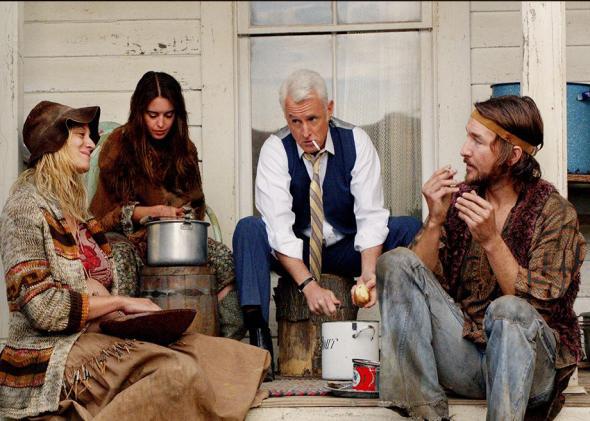Willa, Seth,
“Sour” is just the word to describe what it was like to watch Peggy boss Don around—ineptly—in this week’s episode. But it also describes Peggy’s development all season. Her life seems to have curdled, like milk with lemon squeezed in. The triumph of last season’s final shot—Peggy in Don’s chair, back turned, wearing the literal pants—has leached away, and we’re left with a shrill, brittle, strident, unlikeable woman.
I’m using those sexist descriptors on purpose—giving them a test run because I can’t decide if the show is being sexist or astute about sexism in its treatment of Peggy this season. As you’ve noted, Willa, Peggy has always been the real protagonist of Mad Men, the one the audience identifies with most, the one who offers entrée into this world by also being an outsider in it. But Peggy has been hard to identify with this season. She’s been obtuse—about Shirley’s flowers, about the motives behind her raise. She’s been brusque and imperious—to Shirley, to Joan about replacing Shirley, to Don as he awaited the partners’ verdict last week. The few moments when she has seemed recognizably human—when she fell to her knees in tears in the solitude of her apartment, and when she cringed after yelling at Shirley in her embarrassment over the flower mix-up—came when she was alone, in a private space, having pulled the door shut behind her. In public, though, she behaves horribly. Mad Men seems to be positing that the only way Peggy can face the world is to behave like a petulant shrew.
I’ve been flummoxed by this development. Peggy has never had Don’s ability to sense and deftly surf all the currents in the room. She’s made ill-timed outbursts and been a clumsy manager in the past. But she’s never been a straight-up bitch. Shrew, bitch—again, I’m using these terms advisedly. Perhaps Matthew Weiner is trying to show us why career women were (are?) often perceived as bitches. But Peggy isn’t just being perceived as a bitch—she’s being bitchy! Which somewhat undercuts the critique. It’s one thing for Weiner to show us how Peggy’s career arc causes people to write her off. It’s another to suggest that her career arc has turned her into a harridan.
Maybe I’m the sexist here, and Peggy’s specific despair (heartbreak thanks to Ted, anger at Don for enabling Ted’s getaway, frustration at Lou for being both mediocre and in charge) is more than enough to account for her bad behavior. But something about it makes me uncomfortable. Am I alone?
As for Marigold, Willa: This story line suggested that each generation begets its own bad parents. Little Ellery, haunted by abandonment, will probably grow up to be a hovering helicopter dad, inhibiting his kids’ development by cutting their meat until they’re 13. Seth, you’re right that it’s Margaret’s sex life, not her maxi skirt, that irks Roger, causing him to realize that her commune is no better than his own catting around. But I loved her perverse defiance at the muddy end: I turned out OK despite your neglect, so I’m sure my son will survive mine. There was a funny feminism embedded as well—both Mona and Roger are horrified at the thought of a woman abandoning her child, when Roger’s not-dissimilar behavior only ever came in for light chiding. (I also loved the adopted name Marigold, with its implications of weeds running wild, contrary to the gardener’s plan.)
Don’s battle with the machine was also marvelous to witness—has any TV episode ever conveyed so well just how annoying it is to live through ongoing construction?—but I didn’t quite take the metaphor straight. The computer took the creatives’ lunchroom, but it’s not going to take their jobs. A computer can’t write copy, not in 1969 and not today. The computer is much more likely to replace the Harry Cranes—the schedulers, programmers, and planners of the ad world.
I think, on some level, Don gets this. He enjoys his conversation with Lloyd, because, once again, he has his finger in the wind, sussing out what’s coming next. What disappoints him, what sends him drunkenly into the arms of Freddie Rumsen, is the fact that no one cares. The (real) partners are indifferent to his virtues, his work, his sense of the moment and the business opportunities he might bring in. They stuck him in Lane’s office because they wish he was dead too. That, I think, was the real blow.
Muddily,
Julia
Read all of Slate’s coverage of Mad Men.
